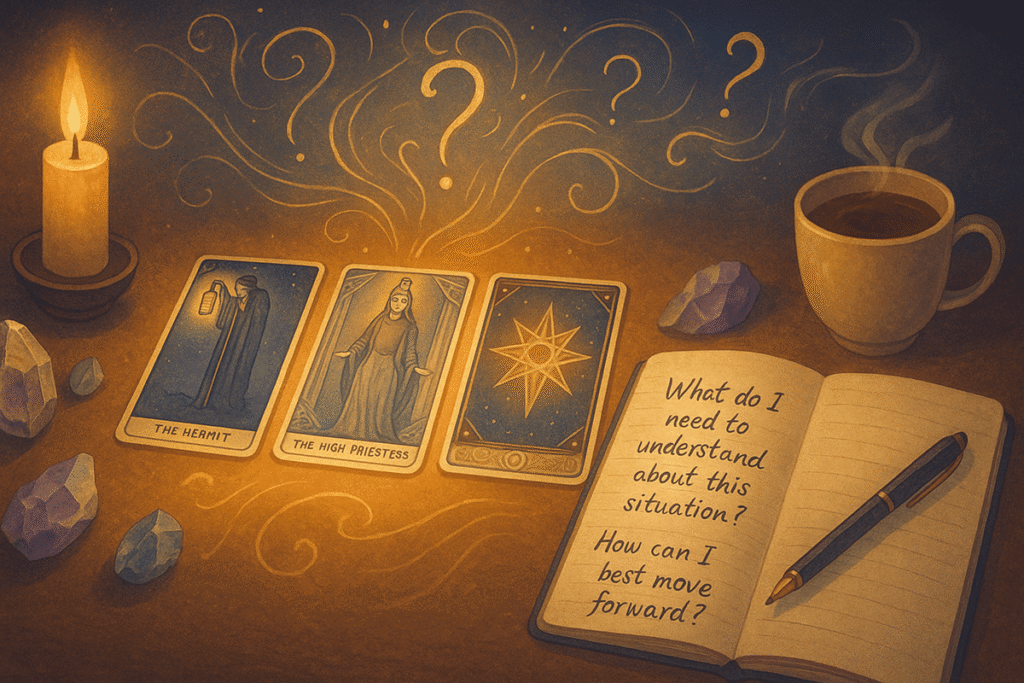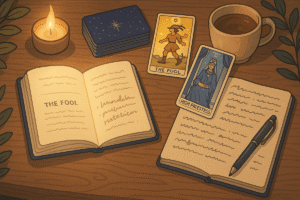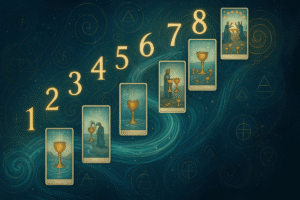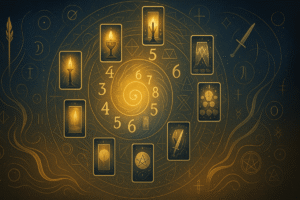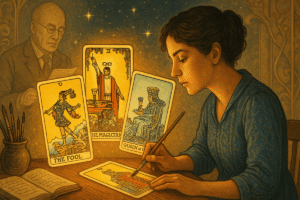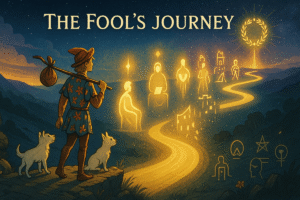Table of Contents
The way you ask questions during a tarot reading can completely transform your experience. I’ve noticed that many people approach tarot with the wrong mindset, expecting it to function like a magic 8-ball that delivers concrete predictions about their future. This approach often leaves them frustrated and confused when the cards don’t provide the black-and-white answers they’re seeking.
Perhaps the most important shift you can make is understanding that tarot works best as a mirror for reflection rather than a crystal ball for prediction. The cards don’t tell you what will happen; they help you explore what’s already within your awareness, waiting to be discovered.
Why Traditional Questions Fall Short
Most beginners start with questions like “Will I get the job?” or “Is he the one for me?” These yes/no questions might seem straightforward, but they actually limit the wisdom tarot can offer. When you ask for a simple yes or no answer, you’re essentially asking the cards to make decisions for you rather than empowering yourself to make informed choices.
I think there’s something fundamentally problematic about seeking certainty from an uncertain future. Life is complex, and reducing it to binary outcomes doesn’t honor the nuanced reality we all live in. When you ask predictive questions, you’re also placing yourself in a passive role, waiting for fate to unfold rather than recognizing your own agency in shaping your path.
The confusion that often arises from yes/no questions isn’t necessarily because the cards are wrong. It’s because these questions don’t match how life actually works. A tarot card might show you energy, potential, or hidden influences, but translating that into a simple yes or no requires interpretation that can easily miss the mark.
The Psychology Behind Empowering Questions
Empowering questions work differently because they engage your analytical mind and emotional intelligence simultaneously. Instead of seeking external validation or prediction, these questions invite you to examine your own thoughts, feelings, and motivations more deeply.
When you ask “What do I need to understand about this situation?” you’re acknowledging that you already possess wisdom about your circumstances. The cards become a tool for accessing that inner knowledge rather than replacing your judgment. This approach aligns with what many therapists and coaches understand about human psychology: we often know more about our situations than we consciously realize.
There’s something quite liberating about shifting from “What will happen?” to “What can I learn?” The first question makes you a victim of circumstance, while the second positions you as an active participant in your own growth. I’ve found that this subtle shift in framing can completely change how you relate to challenging situations in your life.
The reflective nature of empowering questions also helps you develop better self-awareness over time. Regular practice with these types of inquiries can enhance your ability to recognize patterns, understand your reactions, and make more conscious choices in daily life.
Transforming Predictive Questions into Empowering Ones
Let me show you how to reframe common predictive questions into more empowering alternatives. Instead of asking “Will I find love?” try “What qualities would help me attract a healthy relationship?” This shift moves you from waiting for love to happen to actively cultivating the conditions that support meaningful connection.
Rather than “Should I quit my job?” consider asking “What aspects of my current work situation deserve closer examination?” This approach helps you identify specific issues and potential solutions rather than seeking a blanket directive about a complex decision.
The question “Will I be successful?” becomes much more useful when reframed as “What strengths can I develop to move toward my goals?” Suddenly, you’re not waiting for success to arrive; you’re exploring concrete steps you can take to create it.
I particularly like transforming financial questions this way. “Will I have money problems?” doesn’t offer much actionable insight, but “What relationship patterns with money deserve my attention?” opens up opportunities for genuine self-reflection and positive change.
Categories of Empowering Questions
Understanding and Clarity Questions
These questions help you see situations from new perspectives. “What am I not seeing clearly about this relationship?” or “What underlying patterns are influencing this recurring challenge?” Questions in this category assume that clarity is possible and that you have the capacity to understand your circumstances more deeply.
I find that clarity questions work particularly well when you’re feeling stuck or confused. They don’t promise to eliminate uncertainty, but they can help you identify what you do know and what areas might benefit from further reflection.
Growth and Development Questions
Personal growth questions focus on your evolution as a person. “What qualities am I ready to develop?” or “What old patterns are no longer serving me?” These inquiries position challenges as opportunities for development rather than problems to be solved.
There’s something quite hopeful about growth-oriented questions. They assume that you’re capable of change and that difficult situations might actually be catalysts for positive transformation. This perspective can be especially helpful during transitional periods or when facing recurring challenges.
Action and Empowerment Questions
These questions help you identify concrete steps you can take. “What small action could create positive momentum in this area?” or “What resources do I have that I’m not fully utilizing?” The focus shifts from what might happen to you to what you can actively do.
Action questions work well when you’re feeling powerless or overwhelmed. They remind you that even in difficult circumstances, there are usually some choices available to you, even if they’re small ones.
Inner Wisdom Questions
Perhaps my favorite category involves questions that help you access your own intuitive knowledge. “What does my inner voice want me to know about this situation?” or “What would I advise a friend facing similar circumstances?” These questions acknowledge that you already possess wisdom about your life.
Inner wisdom questions can be particularly powerful because they help you distinguish between what you think you should want and what you actually want. Sometimes the difference is quite surprising.
Crafting Questions for Common Life Areas
Career and Purpose
Instead of asking whether you’ll get a promotion or if you should change careers, try exploring what fulfillment means to you in professional contexts. “What aspects of work bring me the most energy?” or “What values do I want my career to reflect?” can provide much richer guidance than predictive questions about job outcomes.
Career questions benefit from focusing on alignment rather than achievement. When you understand what truly matters to you professionally, decisions about specific opportunities become much clearer.
Relationships and Love
Relationship questions work best when they focus on your own growth and understanding rather than trying to predict someone else’s behavior. “What communication patterns could I improve in my relationships?” or “What do I need to heal within myself to attract healthier connections?”
I think relationship questions are where the empowering approach really shines. You can’t control other people, but you can always work on becoming the kind of person who naturally attracts the relationships you want.
Personal Growth and Spirituality
Questions about personal development can explore both challenges and strengths. “What spiritual practices would support me right now?” or “What aspects of my personality are ready for integration?” These inquiries assume that growth is an ongoing process rather than a destination.
Spiritual questions work particularly well with tarot because they honor the mysterious and symbolic nature of the cards while still providing practical insights for daily life.
Creativity and Self-Expression
Creative questions can help you identify blocks and discover new avenues for expression. “What wants to be created through me?” or “What fears are holding back my creative expression?” These questions treat creativity as a natural force rather than a talent you either have or don’t have.
The Art of Question Timing
The timing of when you ask empowering questions can significantly impact their effectiveness. I’ve noticed that questions asked during emotionally intense moments sometimes produce different insights than the same questions asked during calmer periods.
There’s value in both approaches, actually. Emergency questions during crisis moments might help you access immediate wisdom for navigation, while reflective questions during peaceful times can support deeper, long-term understanding.
Consider keeping a journal of the questions that resonate most strongly with you during different life phases. You might discover patterns in what types of inquiry serve you best under various circumstances.
Building Your Question-Asking Skills
Like any skill, crafting empowering questions improves with practice. Start by noticing when you slip into predictive thinking and gently redirect yourself toward more exploratory language. It takes time to break the habit of seeking external answers to internal questions.
Perhaps begin with one category of empowering questions that feels most natural to you, then gradually expand your repertoire. Some people connect immediately with action-oriented questions, while others prefer the introspective approach of inner wisdom inquiries.
Remember that there’s no perfect question for every situation. Sometimes you’ll ask something that doesn’t quite hit the mark, and that’s completely normal. The process of refining your questions is part of developing a more nuanced relationship with both tarot and your own inner wisdom.
The goal isn’t to never feel uncertain or confused. It’s to develop tools that help you navigate uncertainty with more grace and self-awareness. Empowering questions don’t eliminate life’s complexities, but they can help you engage with those complexities more skillfully.
When you approach tarot with empowering questions, you’re treating it as a sophisticated tool for self-reflection rather than a simple fortune-telling device. This shift in perspective can transform not just your readings, but your entire relationship with personal growth and decision-making.
Frequently Asked Questions
Can I still ask about relationships or career without making it predictive?
Absolutely. The key is shifting from questions like “Will I get the job?” to more empowering alternatives such as “What strengths can I develop to move toward my career goals?” or “What patterns in my relationships deserve closer examination?” This approach keeps you focused on what you can actually influence rather than waiting for fate to decide your outcomes.
Why do “should I” questions limit my tarot reading?
“Should I” questions close down conversation and questioning, giving away your power to make your own choices rather than opening your perspective in any meaningful way. When you ask the cards to make decisions for you, you’re positioning yourself as passive rather than recognizing your own agency. Questions like “What do I need to understand about this situation?” help you access your own wisdom instead of seeking external validation.
How specific should my questions be?
There’s a balance to strike between being too vague and too narrow. Establishing a time frame can help keep big questions focused, while smaller spreads can help narrow down options and let the real issue rise to the surface. Think about what you genuinely want to explore rather than just the first question that pops into your head, and be willing to break larger questions into smaller, more targeted inquiries.
What if I get a confusing or seemingly negative card?
Remember that tarot readings are meant to provide material for reflection, understanding, and action rather than definitive predictions. A card that seems negative at first often reveals valuable insights when you approach it with an empowering question. Instead of interpreting it as bad news, ask yourself what the card might be inviting you to examine or what perspective it offers that you hadn’t considered before.

